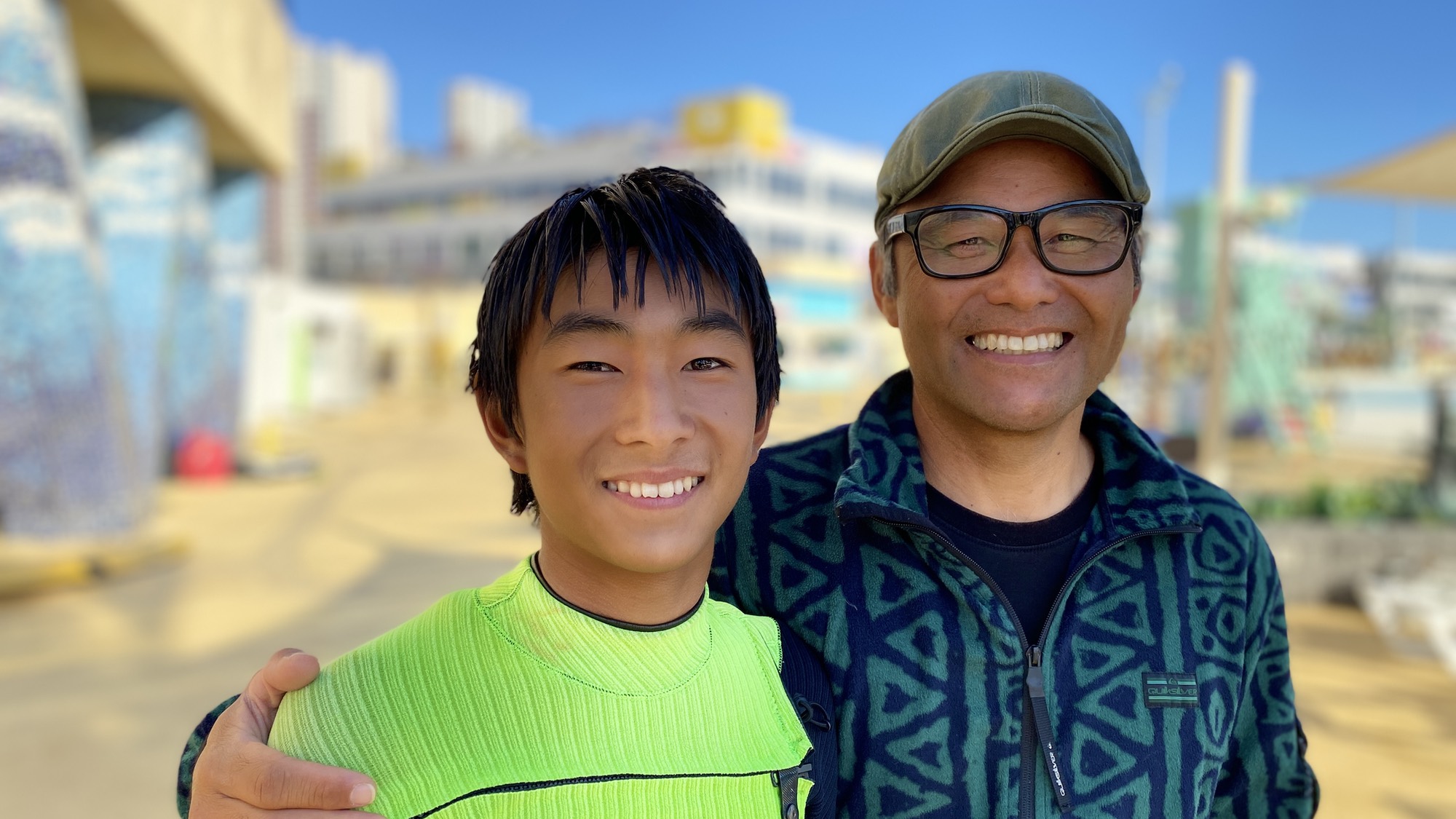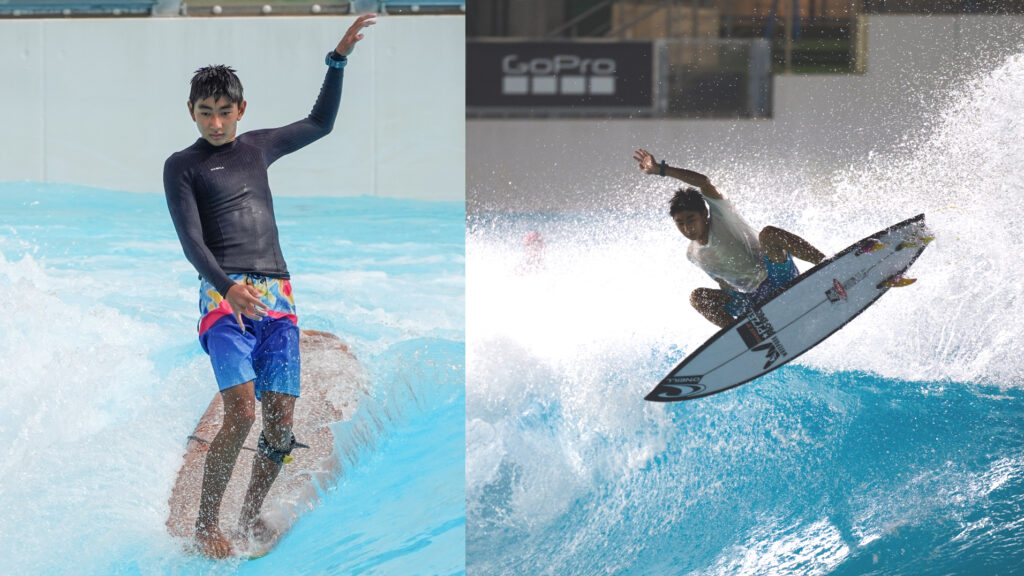Sponsored by a Wave Pool – Meet Wave Park Korea locals Kanoa & Mel Palmiano

Siheung-Si sits southwest of Seoul on the Yellow Sea. It was once a factory town. Then it was razed. Then the Daewoo Co built a wave pool and surrounded it with amenities to create a new Resortlandia of sorts. Presto. New surf spot. And while the goal was to lure weekenders from Seoul, the Wave Park inadvertently became a training ground for Korea’s budding pros and Olympic hopefuls. During WavePoolMag’s visit we met an on-point goofy foot, surfing with flair, nailing air reverses and obviously growing into his lanky frame the way 15-year-olds do.
Kanoa HeeJae Palmiano has aspirations to grow up and become Korea’s best surfer, and he’s well on his way to this goal. With the support of his family, access to three coastlines, and a world-class surf park, he’s currently filling his shopping cart with all the necessary tricks needed to compete on the world stage. We wanted to find out how a wave pool plays into one’s aspirations of a surfing career. So we sat down and chatted with Kanoa HeeJae Palmiano and his father Mel.

Kanoa HeeJae Palmiano
How often do you visit Wave Park? We come to Wave Park when the ocean is flat.
How accurate are the surf forecasts? Can you rely on them a week out or just a couple days ahead of time? Sometimes they’re accurate a week out, but they can change quite a bit too. The forecasts vary.
When you come here to surf wave after wave, is it purely for fun or do you go to work and practice specific things? I work on technical skills that can be difficult to practice in the ocean—things like going vertical and refining my technique.
Can you describe what particular technique you’re focusing on right now? Currently on my backside, I am trying to go straight up, stay vertical, and maintain a lower stance on my bottom turn.
Do you practice airs here? And do you find it helps improve your technique? Yes, absolutely. I practice a lot at this park and even landed my first air reverse here.
Tell me about your daily routine. How do you balance school with surfing time? When the waves aren’t good, I study in the mornings and focus on balance training at home, along with doing some Wave Ki.
And what about your future plans? Do you want to pursue a career as a doctor, professor, astronaut or something else entirely? My goal is to be a pro surfer and hopefully make it to the Olympics one day.
Melvin
So, how is it being a surf dad here? Your son is talented, but there isn’t much surfing infrastructure in Korea. If you were in San Clemente, he would be at Lowers every day with you filming him. How is it trying to make something happen in such a new surf culture?
Well, it’s definitely a challenge here. But it’s relatively easy in a sense that you can communicate with people online and ask questions. But you still have to do everything yourself and figure out what to do and how to get him in the water as often as possible. It’s nice that we have Wave Park because it is accessible, although it’s a bit of a drive from our home in Yang Yang. The surf culture here is still in its first generation or so. There have been some South Korean surf pioneers, but there is no established system or program yet. So we’re trying to do it ourselves and figure out what to do and where to go.
So what do you do?
We keep busy and travel. We joined the Canadian Nationals (Mel is Canadian) and he joined the under 16s and actually came in second. He would have been in first if the Heat ended 30 seconds earlier. But that’s surfing and I basically tell Kanoa that. If you have a group of surfers who are similar in terms of skill, sometimes it comes down to luck at the end. And so we were just unlucky, but it was nice for him to actually surf against his peers in his age group because usually in Korea he’s surfing against adults. He’s a 14 year old kid surfing against guys who are in their mid twenties or early twenties. So, you know, strength wise and stuff, he’s at a disadvantage. But in terms of the actual skill of surfing, he can measure up to them. But yeah, we just basically try to give him the opportunities to go out and compete. Again, just to give him context, experience, travel experience, surf experience, meet the other surfers, ask questions, and really just try and ingrain himself and see if he actually wants to pursue this sort of career.
Is it hard to keep up with surfers his age who are from California or Hawaii, or other parts of the world?
You know, they kind of have it nice that they actually have consistent waves and they have a group of peers that they can compete against and are motivated to try and outdo. Whereas here it’s hard to stay motivated especially if you’re sort of training on your own. So it’s usually just us to and we go out and he is home schooled. So I mean, we do have the ability to be flexible with our time. We get to travel, but on a daily basis in terms of practice, it’s really hard to see who you measure up to when everybody you’re surfing against is older. So we do hope to join the ISA games, whether it’s the junior competition or the men’s World Games, With Juniors you have a better grasp of seeing where he measures up against kids his age. As opposed to like going to the World Games and having a heat with somebody who’s on the Word Tour.
How did the Wave Park sponsorship come about and what does it mean for Kanoa?
We have Dony, the Wave Park Surf Manager, to thank. As well as team coaches like Jina for approaching management and recommending that Kanoa be a “Wave Park Athlete.” I think they decided to sponsor him because he travels quite a bit for surf contests, represents Korea, can speak English, and meets a lot of surfers who ask about Wave Park, the wave settings, etc. Being a Wave Park Athlete is such an amazing honour and opportunity for Kanoa. We spent a lot of hours traveling to Wave Park from YangYang and it has been well-worth it. It really means so much to us because it allows Kanoa to visit and surf almost every day.
Related Coverage
